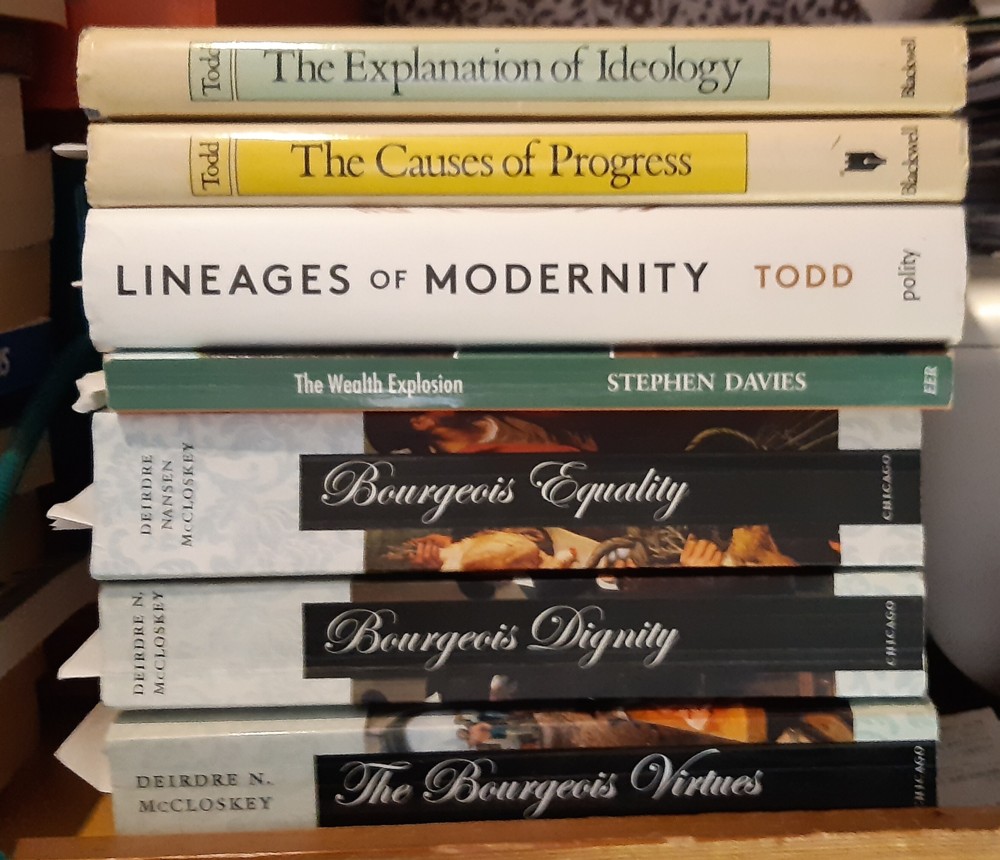During a recent conversation that Patrick Crozier and I recorded (although as always Patrick did all the button-pushing and editing), about how the Industrial Revolution came about, Patrick asked a question that I didn’t answer at the time but which I think I can now answer, at least in broad brush strokes.
My thesis was and is that the Industrial Revolution was and is the English Revolution. It was an ideological event, sparked by mass literacy, just as the French, Russian and Chinese Revolutions were. (See all my Emmanuel Todd postings.) Patrick pointed out that, unlike those three very political revolutions, the English Revolution, if that’s what it was, sure took its time to mutate into the Industrial Revolution. The political bit of the English Revolution happened in the seventeenth century, but the big impact of the industrial bit of the English Revolution didn’t achieve lift-off until late in the eighteenth century.
At the time, I just said yes, hm, I’ll have to think about that. But now I have, and I think the answer is not that difficult to supply.
The three very political revolutions were successful, not in the sense they accomplished much that was good, but in the lesser sense that they did at least achieve political dominance, after which they did their best to improve things but ended up doing mostly their worst. They were all very destructive in their impact. And this all happened very quickly. Destruction and catastrophe doesn’t take very long to happen.
But the English Revolution stalled politically. The political bit of it ended in a draw, with the old monarchical and aristocratic institutions changing quite radically, but not being destroyed. And so, having failed to make the big breakthrough in the manner of the French, Russian and Chinese ideological breakthroughs, the English Revolution turned its attention to peaceful progress. To “improvement”, to use the word the English ideologists themselves used.
And, improvement takes time. As the English eighteenth century unfolded, presided over by a rather contentious and corrupt mixture of aristocrats and well-connected capitalists, the ideologists of improvement started to achieve actual improvements, step by inventive step. They were creative rather than destructive, and creativity takes time. I say “started”, but in truth they merely somewhat accelerated a process of step-by-step invention and innovation that had already got under way.
And that’s my answer, for the time being. Destruction happens quickly, and the quicker it happens the more it “succeeds”. Creativity, aka actual improvement, takes far longer.
This ideology of improvement spread, way beyond England, first to America, subsequently to Germany, and now everyone. And the world outside Britain and America realised they couldn’t beat the damn Anglos with only their own atavistic and destructive methods, adorned by mere political rhetoric. To hold their own against the Anglosphere, they realised that they would have to copy it. So, they did. And the English ideology of constant improvement now rules the world. We now all live, with ever greater ease and comfort and contentment, in that world.
The English Revolution is, on the whole, not understood by modern educated people. Insofar as the typical Educated Modern has a theory of how all this happened, it is that the English achieved their industrial revolution pretty much by accident. In other words it wasn’t a “revolution” at all, because there were no revolutionaries in the usual sense. Selfish go-getters achieved a mass economic breakthrough that was neither anticipated nor even wanted in each of their individual, selfish little plans. Adam Smith, basically. But the English Revolution, which was and is the global industrial revolution, was an ideological event as well as a merely economic event. Modern educated people cannot see this, because that would involve realising that here was a gang of starry-eyed ideologists and idealists and altruists, with a radical and ludicrously optimistic plan for transforming the lives of all humans everywhere for the better, making omelettes and breaking eggs with relentless single-mindedness. And their plan ended up being triumphantly, fabulously, world transformingly successful. Educated Moderns just don’t have a mental box in which to place events like this. Ideologists always fail, always cause havoc. Even most ideologists nowadays proclaim that their alleged creative miracles, in the radiant future that they proclaim, must be preceded by a phase of destructiveness, during which they destroy all the human barriers to their vision, and of course the rest of us assume that this is all that they will ever accomplish.
But the English Revolution was not like that. It was a Revolution, but a Revolution which only began by being destructive. That part of it failed, in that the political regime that it tried to overthrow was merely modified somewhat. So instead, the English Revolution turned its collective mind towards creativity, and in that it succeeded, beyond its wildest dreams.
To any commenters who want to say it, let me say it first. I know that I haven’t proved, or even really argued, the above proclamation. I have simply proclaimed it. But although I haven’t proved it, I am nevertheless right about all this.


